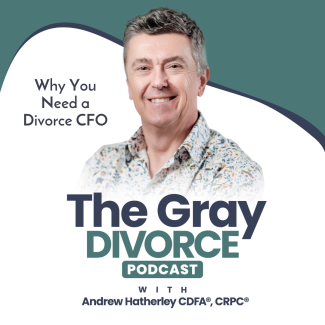
The Gray Divorce Podcast: Episode 56 Why You Need a Divorce CFO
Your divorce settlement is the financial foundation for your new life after divorce. That’s why it is so important that you get the divorce settlement right, particularly if your divorce is coming later in life. Adding to the challenge is that emotions may be strained for both you and your soon-to-be ex. Anger, resentment, denial, fear. All these emotions work against your financial future and could result in costly mistakes that could affect your retirement, that could force you to work longer than you want and potentially enter or reenter the workforce in difficult circumstances.
But divorce doesn't usually bring out the best in us. Conflict, regret, anxiety about the future, sadness: all of these can take a toll on us.
Divorce professionals have coined the term “Divorce Brain” for the diminished state of mind that can lead to bad behavior and bad decisions.
“Divorce Brain” may result in:
- Not learning how the divorce process works in your state.
- Letting your emotions override settlement negotiations.
- Neglecting your physical and mental health.
- Finding “band-aids” in alcohol, drugs and promiscuity.
Divorce Brain can cause you to:
- Rush to “get it over quickly”.
- Want to save money and do it yourself.
- Hire the wrong attorney.
- Fail to consult with divorce professionals in finance, emotional counsellors, lending divorce/life coaching.
Divorce is a legal process. But let's face it, it's really about money.
Which is why you need a divorce CFO!
- Here is just a sample of the areas in which a Divorce CFO can play a crucial role on your divorce team:
- Helping you gather and organize essential documents and to work with your attorney to present these in a clear in comprehensive manner.
- They evaluate the value of marital assets, such as real estate, retirement accounts, investments, and personal property.
- Helping your attorney structure a tax efficient settlement by analyzing how each asset will be taxed upon sale, which can result in your keeping more money for yourself and not giving it to Uncle Sam,
- Reviewing your temporary and post-divorce budgets as they relate to getting through the divorce process and spousal support
- Analyze spousal support scenarios to determine what is fair and sustainable for you.
- Explain how support payments will impact your financial situation.
- Highlighting financial issues such as marital settlement language that can help you with mortgage financing after divorce,
- Help you determine values of separate vs marital property. This is typically done on big ticket items like home equity and retirement accounts.
- Discovering undisclosed accounts
- Help you understand how different types of retirement plans 401K, 403 B, IRA, Roth IRA are treated differently in divorce.
- Helping with complicated stock options issues,
- Reviewing whether future spousal support income streams are insured against the potential death of the payor
- Help the attorney navigate the complicated rules relating to annuity division and divorce.
- Helping to understand the valuation and division of pensions,
- Helping you understand the implications of keeping or selling the primary family residence or investment real estate assets
Many CDFAs specialize in working with a specific niche. Obviously, my niche is people going through or emerging from gray divorce. CDFAs may be like attorneys in that some specialize in working in out of court solutions like mediation or amicable divorce while others prefer to work to support litigating attorneys.
When interviewing a Certified Divorce Financial Analyst (CDFA) to assist with your divorce some specific questions you should consider asking them would be:
- How long have you been working as a CDFA?
- Look for a professional with substantial experience in divorce-related financial planning.
- What is your professional background?
- Understand if they have expertise in areas such as tax law, investments, budgeting, or retirement planning.
- Do you have experience with cases like mine?
- If your divorce involves complex issues (e.g., high-value assets, business ownership, international investments), confirm their experience in these areas.
- How do you work with other professionals, such as attorneys or mediators?
- A good CDFA collaborates seamlessly with legal teams and mediators.
- What are your fees, and how are they structured?
- Clarify if they charge an hourly rate, flat fee, or retainer.
- Are there additional costs for specific services (e.g., tax planning, retirement division analysis)?
- Ensure you have a full understanding of their pricing model.
- What documents or information will you need from me?
- Understand what preparation will be required on your end.
- How do you handle confidentiality?
- Ensure your financial information will be kept secure and private.
Ultimately, it's up to you to find a Divorce CFO with whom you are comfortable, someone you trust and who meets your needs.
If you’d like to chat to see if we might be a good fit to work together, I offer a limited number of free 30-minute strategy sessions every month. Just shoot me an e-mail at andrew@wiserdivorcesolutions.com.
Resources
Handout - The 11 Things You Need to do Now in Divorce
Podcast Episode - The Amicable Divorce Network with Tracy Ann Moore-Grant
Podcast Episode - Alternatives to Litigation - Mediation and Collaborative Law
Podcast episode - The Perils of Do-it-Yourself Divorce

